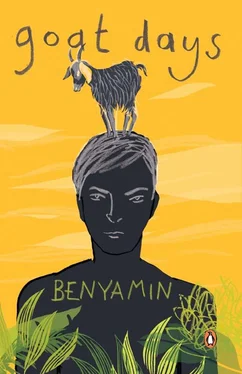‘What is past is past. Forget it and try to eat something.’ ‘There is no place to improve health like the prison. We must return at least as we landed here. Don’t make your wife lament on seeing you when you return. Only we need to suffer what we have endured.’ Hameed tried to console me with such words. Despite all the kind words, I couldn’t be consoled. Even the word mutton made my eyes moist.
In the beginning, I would realize that it was mutton in the biryani only after touching the food on the plate. I would then just shake it off my hand, get up and go away. Later, I began enquiring in advance. On the mutton days, I wouldn’t even sit for the meal; I would restrict myself to the tea and biscuits served after asar. It was the same at night. When khubus and meat were served in the meal between the maghreb and isha prayers, I would back off if there was mutton on the plate. If I was very hungry, I would dip the khubus in water and eat. I had no difficulty in eating khubus without a curry. That had been my diet for many years!
Sumesi jail did not have any of the oft-heard characteristics of a prison. We led a very free life within the block. Maybe we had such freedom because those sentenced for serious offences were housed in another prison or in a different block. In our block we had lawbreakers who were without visas, those whose visas had expired, or those who did not have pathakas, and Muslims who had been out on the streets during prayer time or prepared food during Ramadan, those who smoked in public places, engaged in black magic and had minor scuffles with Arabs and the like. Those with petty or minor sentences and those condemned to be exiled.
I don’t recall such carefree days ever in my life. We had food at fixed times, prayed, slept enough and more, reflected pointlessly, talked as much as we liked, and dreamt about our future. The world didn’t know us. We didn’t know the world either. That was prison.
Hameed only complained about the lack of a facility to bathe. I laughed when I heard him mumble to himself, after a week in prison, about the clammy air and increasing body odour. Then, I calculated with my fingers. Three years, four months, nine days. I laughed aloud again when I thought about it. Maybe even Hameed wouldn’t have understood the meaning of my laughter.
Everyone who ended up in the jail had a story like mine to tell — of pain, sorrow, suffering, tears, innocence, helplessness. Perhaps you have heard similar stories elsewhere. I don’t want to belittle the pain of others. For each, the path he travelled was harsh. The losses were such that no one could ever compensate for them. I even felt that the sorrows in my life were small compared to the sufferings of some others. In fact, some of these agonizing accounts helped me to come out of my own grief and made it possible for me to continue living to tell you this story. Otherwise, under the weight of my sorrow, I would have committed suicide. A way to come out of our sorrow is to listen to the stories of those who endure situations worse than ours.
Every week there was an identification parade in the prison. It was the day for the Arabs to identify the absconding workers — a tear-filled day in prison. On that day, after breakfast, all of us were made to stand in a line outside the block. Arabs would walk in front of us looking at each face carefully, like eyewitnesses trying to identify the accused. There would be a few unfortunate ones among us each week. The first reaction of the Arab who recognized his worker was to land a slap that could pop an eardrum. Some even unbuckled their belts to whip the prisoners till their anger subsided. The policemen would keep an eye on the scene from a distance, and might not even pay attention. Knowing this, some prisoners who spotted their sponsors from a distance, lost all courage and cried loudly. It was only then that one realized how a man becomes a coward when he feels completely helpless. For him, the jail must have provided relief from the suffering he had been enduring. For many, it was inconceivable to return to the Arabs who had been torturing them. They must have endured so many beatings before they reached the jail.
But the Arabs didn’t have any compassion or consideration. They would immediately take the prisoners away shouting accusations: he ran away after stealing my money; he tried to rape my daughter; he tried to kill me. The prisoner’s face would reflect the abjection of a goat being led to slaughter. His loud cries protesting his innocence would soar above the jail walls; it would be a cry in the wilderness. The Arabs could execute the law as they pleased.
The Arab enjoyed more freedom inside a prison in his country than we did outside in a foreign land. On these parade days, any Arab could freely move around the Sumesi prison if he carried a paper showing that he had registered a complaint in a police station. If he managed to find his absconding slave, he could drag him out and present him before the jail warden and submit his petition to him. The nature of the case would change. The man who was in prison for a petty case would be turned into a criminal offender. It was then either the shariah or the law of the court. The Arab could even demand that he be allowed to take away the prisoner, or that the prisoner be expelled from the country. Here, expulsion was salvation. If the prisoner was ordered to return to the Arab, his fate was sealed.
Remembering my own experience, I shuddered to think what the Arab would do to the absconder. One could only pray to Allah to strengthen those unfortunate ones so that they are able to survive even that ordeal.
On parade day, the block would be eerily quiet. We would grieve for the loss of friends who had been with us in the block till then, sharing food, talking, smiling and playing, dreaming of homeland. Our ears would be ringing with their long howls from the main hall and beyond. No one would be in the mood to eat, drink, talk or sleep. By the time that pain faded, it was parade day again. That day would be the lot of other innocents. Prison wasn’t entirely pleasant a memory after all!
Hundreds of Arabs would cross our parade line in those two hours till lunch. During the first few parade days Hameed and I were terrified. Two hours of agonizing fear, not knowing when misfortune would come in search of us. Even the shadow of a likeness resulted in incredible tension. The fear would only go when we became sure that it wasn’t anyone familiar.
Although we had to wade through the tears of many unlucky ones, we felt great relief when that two-hour ordeal ended. Forgive me for my selfishness, but I felt glad that no one had come looking for me. Maybe it was the routine nature of its occurrence that the tension slowly began to fade on parade days. Maybe it was the confidence that the reasonable time frame for anyone to come looking for me was over.
Anyone absconding from his sponsor was likely to end up in the police net within a fortnight, or, at the most, within a month; otherwise, he was thought to have found a safe haven. It was considered impossible for any Arab to find him then. There were many who stayed on without any documents. As they were aware of this, the Arabs would give up their search within a month or two. A complaint would remain registered with the police. If he was found after all that, then the Arab was lucky — that’s all.
As we crossed that period, Hameed and I were relieved. Nobody was ever going to come searching for us. And being in the line became an amusement and a diversion. Casually talking and cracking jokes, we idled those two hours away. This was our way of dealing with our situation — we had arrived at a compromise with the fear that had once overwhelmed us. This was true for all those who had spent four or five months in the jail.
Читать дальше




![Джон Харгрейв - Mind Hacking [How to Change Your Mind for Good in 21 Days]](/books/404192/dzhon-hargrejv-mind-hacking-how-to-change-your-min-thumb.webp)







